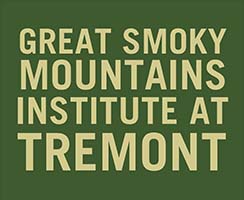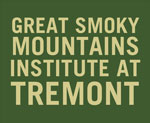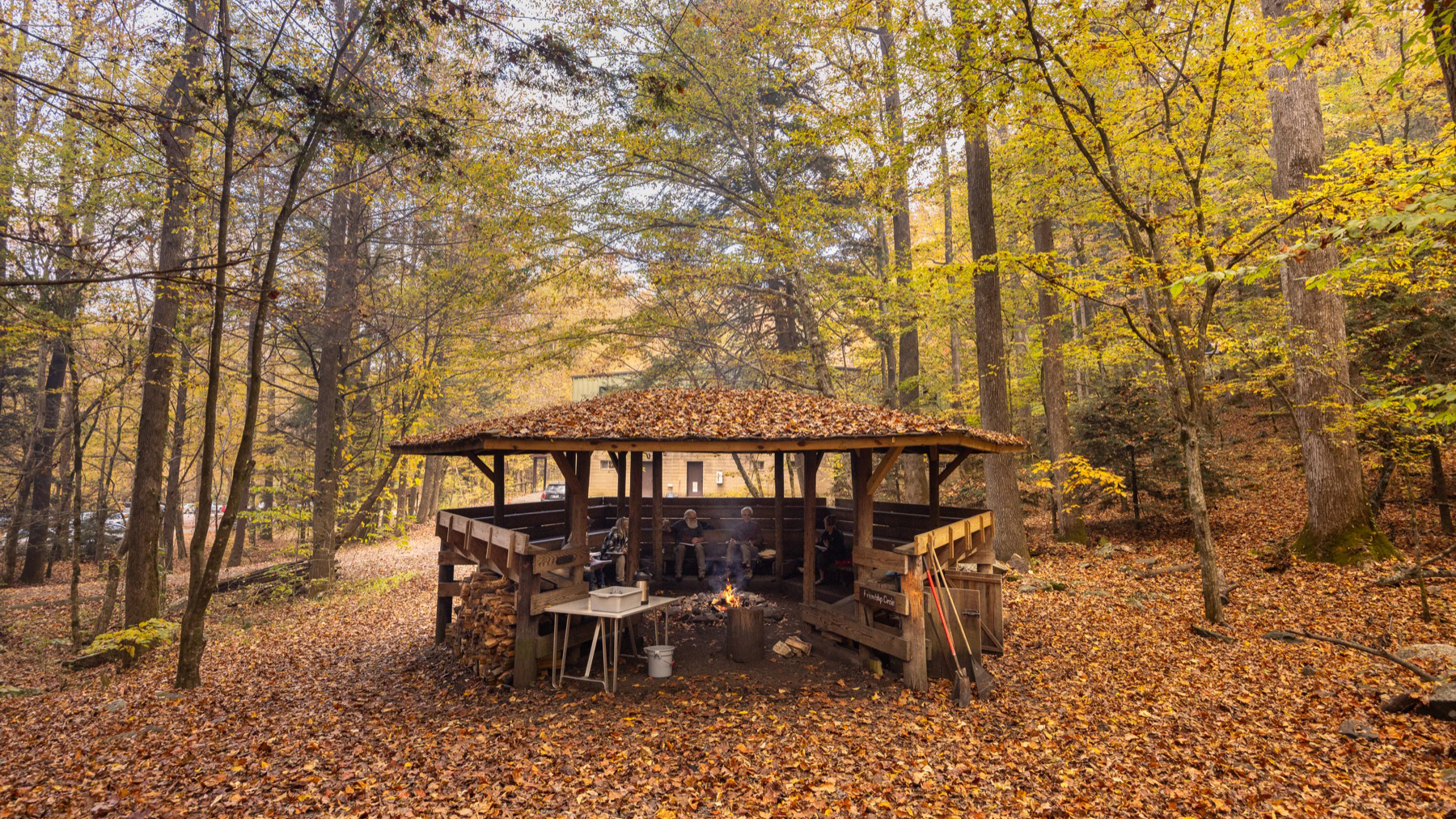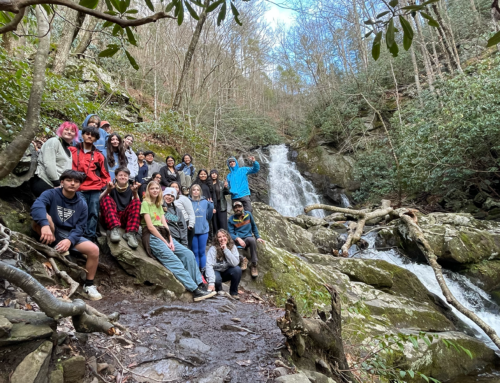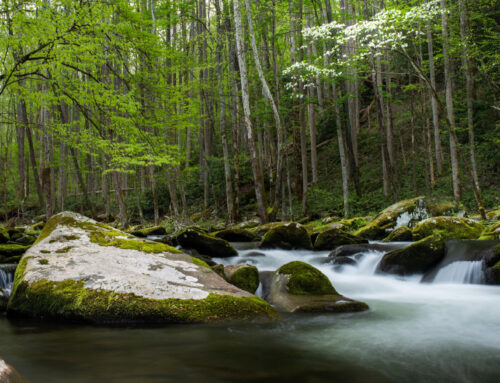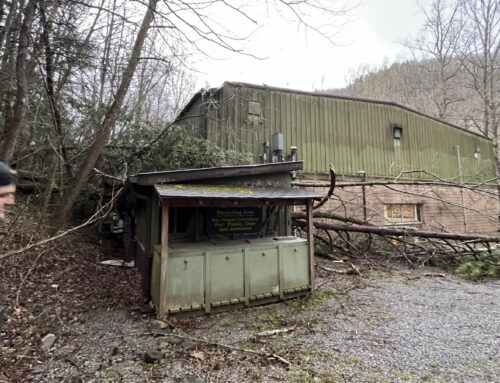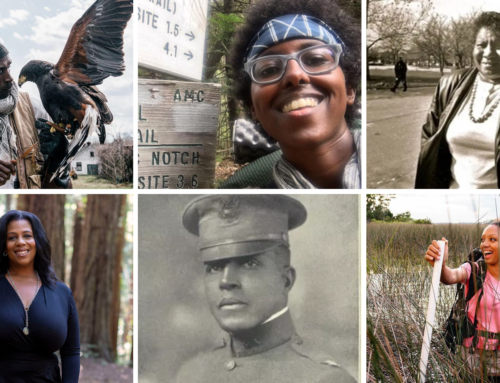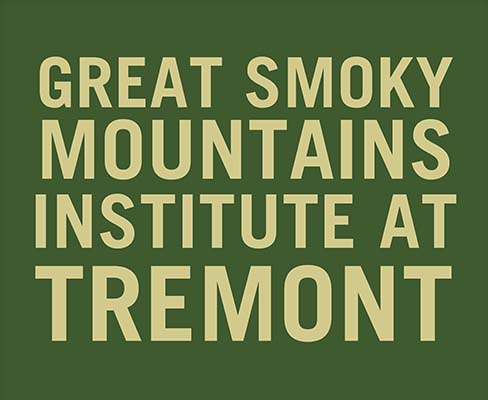Written by Jeremy Lloyd, Manager of Field Programs and Collegiate Studies and author of A Home in Walker Valley: The Story of Tremont. This article was originally published in Smokies Life in February 2024.
Last autumn, as the leaves were changing color in Walker Valley, Tremont Institute held a writers conference for the first time. I had the rare pleasure of designing the conference from start to finish alongside my co-coordinator Frances Figart, creative services director at Smokies Life (formerly Great Smoky Mountains Association), as well as playing maestro once participants arrived.
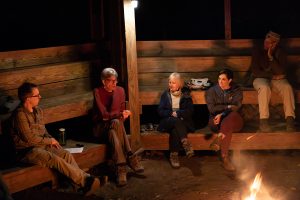
From left: Jeremy Lloyd, Richard Powers, Janet McCue, Annette Saunooke Clapsaddle, and Frank X Walker. Provided by Michele Sons.
It isn’t every day one gets to sit down by a campfire with Richard Powers, a MacArthur Genius Award recipient and Pulitzer Prize-winning author of a novel currently being adapted into a Netflix series, to interview him before a live audience. But I had the privilege of doing just that along with working closely throughout the week with the rest of our author team: Affrilachian poet Frank X Walker, Eastern Band of Cherokee Indians novelist Annette Saunooke Clapsaddle, and Horace Kephart biographer Janet McCue.
HOW IT BEGAN
Writing and literature, broadly speaking, are nothing new to Tremont. One can trace the literary arts back to our earliest beginnings when students wrote poetry each day in their outdoor “sit spots.” Mealtime readings for decades have included short excerpts from the works of Thoreau, Robert W. Service, Helen Keller, John Muir, Sigurd Olson, and Thomas Merton, and more recently Zora Neale Hurston and Robin Wall Kimmerer, just to name a few. One also pictures the allure of our wild setting inspiring people to set pen to paper long before Tremont existed as an outdoor school and education center.
That said, we are probably best known for the way we weave natural history and science into our programming. Hence the name of our summer camp for adults held each June: Naturalist Week. This isn’t by accident, residing as we do in the most biodiverse landscape in North America, which boasts more tree species than Europe and greater salamander diversity than any other place on earth. It’s an ideal spot for investigation of the natural world, which we achieve through a range of community science projects such as bird-banding, salamander monitoring, monarch butterfly tagging, weather monitoring, phenology programs, and lichen study.
And yet “investigation,” in the way we employ the term, goes two ways: both outward and inward. It includes not just the more-than-human world outside our heads but the inner contours of our own selves. We take seriously what Frederick Law Olmsted maintained was one of the purposes behind the creation of national parks by setting aside time and space for the “contemplative faculty,” or personal reflection.
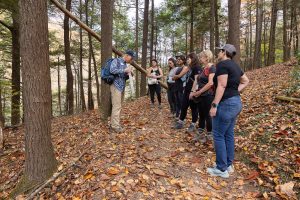
The Tremont Writers Conference includes hands-on activities conducted in the Tremont learning style. Provided by Michele Sons.
Western science provides us with means of engaging with nature that can lead to deep insights. But an overemphasis on it can lead to an overreliance on analytical abilities rooted in the left hemisphere of our brains, often to the neglect of our fuller selves. It tends to leave out poetry and narrative, which are equally legitimate and necessary ways of knowing.
That, of course, is where the humanities come in. Though they have suffered a decline in institutions of higher learning in recent decades, we continue to believe the humanities hold an important place in Tremont’s interdisciplinary approach and how humans are formed through wonder and curiosity. We are storytelling creatures after all. “Without stories, humans are just mammals with weapons,” says author Brian Doyle.
Long story short: the at-first crazy notion of holding a writers conference in Walker Valley—the only one in any national park to our knowledge—began to make perfect sense.
The idea first surfaced when Kentucky author and outdoorsman Ron Ellis pitched it to Tremont’s President & CEO Catey McClary and me. It was around this time that we discovered Richard Powers numbered among our neighbors in nearby Townsend, Tennessee. We became further intrigued upon learning he had described the river that runs through our campus in his novel The Overstory (“There’s still time, though, for a wander down to the rapids of the Middle Prong,” he writes). He also nearly mentioned Tremont by name (“…an institute in the Great Smoky Mountains.”). Months later, after Rick graciously agreed to participate in our project, Tremont Writers Conference became a reality.
Over five packed days, two dozen participants got to experience something so enriching that one person said he wasn’t going to bother attending another writers conference knowing it couldn’t top ours. (I hope he changes his mind.)
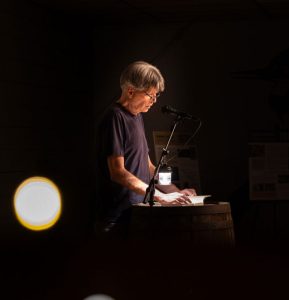
RICHARD POWERS
Naturally, I had to ask Richard Powers about the Middle Prong on the first night as we all gathered around a roaring fire inside the Council House. A frequent swimmer and streamside reader, Rick is well acquainted with the river that flows through Tremont’s campus in Great Smoky Mountains National Park. He enthused not only about the river but also nearby trails that weave through a variety of forest habitats.
The Smokies’ old-growth forests were one of the reasons he relocated to the area a decade ago. “I’m looking at forests Annette’s ancestors might have seen,” he said, recounting his impressions during his first visit. “This could have been the view 8,000 years ago.”
Forests and rivers came up again later in the week when he delivered a reading on campus that included this excerpt from his latest novel, Bewilderment:
“A mile of descending trail dropped us into a clearing by a rocky stream. Patches of white cascade gave way to deeper, open pools. Mountain laurel and stands of mottled sycamore flanked both banks. The site was more beautiful than I remembered.”
Though it is not named, he is describing West Prong Trail and a nearby backcountry campsite located just two miles away.
I had asked Rick to lead a craft talk (a term he preferred over “master class”), unaware that he hadn’t taught since leaving Stanford ten years ago. Out came his stunning presentation on Saturday, called “Five Kinds of Goosebumps: Notes Toward Fictional Awe,” a meditation based partly on John Cheever’s short story masterpiece “The Swimmer.”
Rick’s literary and existential vision can be rather dark at times, perhaps even too dark for some readers. Not so dark that there isn’t any light, but what light his writing brings to the page often illuminates uncomfortable truths about human over-consumption of planetary resources and our potential for bringing about our own demise as a species.
Refusing easy answers and false comfort, he told the group, “Two truths about Life and Literature: All stories—and lives—end. The world does not. We are born, live, and die in the middle of things.”
So how do we live in the meantime? How do we find hope and meaning?
His books don’t have a lot to say about these matters. And yet both The Overstory and Bewildered are filled with moments of light and illustrate one response that also echoes something central to Tremont’s mission: with awe.
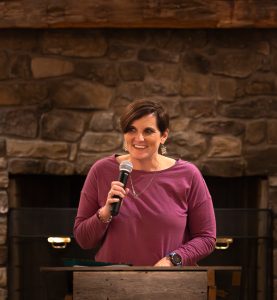
ANNETTE SAUNOOKE CLAPSADDLE
Our next nearest neighbor, Annette Saunooke Clapsaddle, hails from just over Thunderhead Mountain in Qualla, North Carolina. An enrolled member of the Eastern Band of Cherokee Indians and a graduate of both Yale and William and Mary, she is the first person in her tribe to publish a novel.
Not that she found this fact very impressive herself. “What’s more important than being the first is making sure I’m not the last,” she said before a large audience at our public event on the final night at Maryville College’s Clayton Center for the Arts.
In the opening passages of her novel Even As We Breathe, set in the 1940s, protagonist Cowney Sequoyah says, “This land is ours because of what is buried in the ground, not what words appear on a paper.” This compelling statement of course flies in the face of our “New World” juridical understanding of physical spaces, which cuts up the planet into “yours” and “mine.” And it reminds those of us living today that the space now called Great Smoky Mountains National Park was and remains the ancestral homeland of the Cherokee.
Land acknowledgments such as those commonly seen on email signatures have become an increasingly common tool that companies and non-profit organizations like Tremont rely on to convey an indebtedness to Indigenous people, and an awareness of their complicity in colonial history as inheritors (unwilling or otherwise) of its spoils. Annette let me know in no uncertain terms that she isn’t a fan of them.
We spoke several times in the months leading up to the conference about how best to avoid pitfalls organizations often make in land acknowledgments, which can be tone-deaf, performative, or aren’t informed by the perspective of Indigenous people themselves.
In the end I decided to forego a formal land acknowledgment and instead convey that the Cherokee story is a living, breathing one filled not just with heartache and suffering but also with resilience and flourishing deserving of celebration. As I’d heard Cherokee elder and language teacher Tom Belt say just weeks earlier, “Andrew Jackson didn’t win. We’re still here.”
Still here. Those deeply resonant words resounded in other ways during Annette’s time with us.
“We shouldn’t ever separate ourselves from the natural world if we want to survive,” she told everyone the first night. “I think we have a long way to go because we have to listen so much and we’re losing our attention span more and more.”
A solution many writers have not only proposed but illustrated in their writing (Wendell Berry perhaps foremost among them) is digging in, staying put, putting down roots, finding one’s place on earth, and seeking to both understand and defend it while using it wisely.
Annette echoes this sentiment in her own way in the closing pages of her novel, where Cowney says:
“When I was a boy I wanted nothing more than to be as far away from here as I could get. Now I want nothing more than to stay in these hills for the rest of my life, and even beyond it.”
One wonders, of course, if Annette may also be talking about herself.
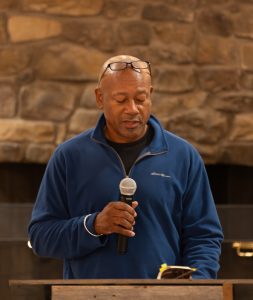
FRANK X WALKER
It seemed fitting on the first night to inform everyone that for a week’s time, Walker Valley would be known as “Frank X Walker Valley” in honor of our guest poet from Kentucky. Frank seemed rather pleased with this arrangement and I doubt he would have objected if we’d kept the name.
Frank may be best known for coining the term Affrilachia to describe the experience of Black people in a region that’s too often regarded in the popular imagination as a white space. Among other achievements, he has authored fourteen books.
As with our other guest authors, Frank’s writing cohort met outdoors each morning, sometimes by a campfire or just feet away from the Middle Prong. I recalled his character York, from his collection Buffalo Dance: The Journey of York, similarly encountering rugged landscapes while camping, though on a much grander scale. First issued in 2004, the collection tells the story of the Lewis and Clark expedition through the lens of York, a man enslaved to Clark and who became the first African American man to traverse the continent.
When I told Frank that Buffalo Dance is one of my favorite works of his, I was delighted to learn it is being adapted into a film and that he recently published an expanded edition with sixteen additional poems. The highly cinematic work contains one poem per page, with each poem delivering a chapter’s worth of emotional weight.
During the conference, Frank divulged his realization that something was missing from the original edition of his collection after spending time with the Nez Perce in Washington with his teenage son several years ago. Missing was what he considered the biggest character of all: Nature.
In “Earth Tones” from that collection, he writes:
Most Indian peoples we come across
seem to be partners with the land,
the water and all things that have breath
or reach for the sun.
This, like every page of this wonderful book, is rich stuff: the “lost” voice of York—an enslaved person—giving voice to Indigenous people as well as the earth itself. Walker fittingly calls York the “the original Affrilachian poet.”
As for Annette’s concerns about our shortening attention spans and the future of reading, which many of us share, Frank’s voice resounded with fatherly authority before a live audience at the Clayton Center: “Not reading is not an option in my household.”
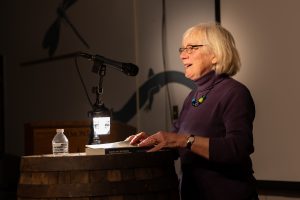
JANET McCUE
Were it not for the subject of Janet McCue’s book, Horace Kephart, none of us would have had reason to be in the Smokies in the first place.
Back of Beyond: A Horace Kephart Biography (published by Smokies Life in 2019 and winner of the Thomas Wolfe Memorial Literary Award that same year) is the story of a librarian-turned-woodsman who was instrumental in helping to create a national park in the Smokies.
I first read Kephart’s well-known book Our Southern Highlanders as a twentysomething in my earliest days at Tremont, sitting in the Oasis and taking notes. It was a pleasure getting to hear about its author straight from one of his biographers.
A city girl who spent her childhood in Pittsburgh, Janet first encountered the Smokies as a twentysomething while backpacking in the 1970s. “That’s where I first ‘met’ Mr. Kephart,” she said. One of those early trips was memorable for a different reason when, while hiking on a trail with over a dozen stream crossings, she lost her wedding ring.
She wrote a paper about Kephart in graduate school but didn’t pick him up again till she was sixty, when she partnered with George Ellison to write a full-length biography. Her Friday night reading included this excerpt from the prologue to her book, co-authored by Ellison:
“Throughout his life Kephart believed in the recuperative powers inherent in the natural world. And as a young man he began formulating his concepts involving the need to search for and find a place of refuge—or, as he phrased it, a ‘back of beyond.’”
I was excited to learn that Janet’s new book project—another effort with Smokies Life as publisher and with another co-author, this time the filmmaker Paul Bonesteel—will explore the life of George Masa, Kephart’s good friend whose photographic images proved vital in making the national park a reality.
STICKING THE LANDING
Also central to the conference were of course the participants themselves. Sitting around the campfire on the first night, they interviewed one another in pairs before introducing their new acquaintance to the group. The storytelling, through the oral tradition, had begun.
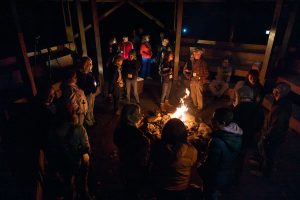
Besides daily writing workshops in poetry, fiction, and nonfiction, they took part in Secret Spots (think “sit spots” for adults), naturalist-led hikes, and Open Mic Night when each person read from their work. During a special evening and meal at Dancing Bear Lodge, many enjoyed a signature cocktail created by chef Jeff Carter in honor of former Blount County resident Cormac McCarthy who had died just months earlier.
The full moon was shining on the final night when we each stepped outside the Clayton Center on Maryville College’s campus following “Writing the Appalachians,” a public event featuring our author team in conversation with one another on stage.
An ideal punctuation mark, it wasn’t really the end of the conference. For weeks later, conference participants were trading their work, scheduling poetry readings over Zoom, and still conversing with their workshop leaders. The magic had only just begun.
We look forward to doing it all over again later this year when we’ll welcome back Frank X Walker as well as workshop leaders Maurice Manning (poetry), Monic Ductan (fiction), and David Brill (nonfiction). We hope you’ll join us! Learn more and apply here.
